“It means, ‘explorer'” said our city bicycling tour guide, Fedinand, this morning, when the first pack of cheering, smiling little children ran after our bicycles, holding out the little hands to high five us. “It’s not a bad word, I promise. They really like seeing you guys here.”
It was a word we’d be hearing a lot over the course of our five hour cycling and information tour today – one that we almost thought wouldn’t happen! The flights from Chicago to Amsterdam, Amsterdam to Moshi, Tanzania, and from Moshi to Dar es Salaam all went smoothly. Getting our $100 apiece visas also went very smoothly – a load off our minds, considering that although we read online that it was possible for almost any nationality to get a visa at the airport, we’d found very few peoples’ experiences documenting it. I’m pleased to report that while it’s a bit disconcerting to hand your passport and a hundred dollar bill to an agent and then told to “go stand over there” for the next hour, things actually worked quite smoothly. We had a little gaggle of 2 dozen or so tourists standing in a corner of the customs area, and every fifteen minutes or so a uniformed official would emerge from a windowed office – we’d perk up, Pavlovian-style, whenever we saw him walking towards the door to see us – with a stack of passports and start shouting off names.
We were met by Edwin, a friendly but thankfully, not overly chatty driver hired by our hotel to pick us up and deposit us at the Collobus Hotel, where they take power saving to whole new extremes. The entire 20 foot square reception room was lit by a single fluorescent bulb and a TV playing a Keanu Reeves movie with Arabic subtitles. I asked the young woman who checked us in ($100 for two nights) whether or not she spoke Arabic, since the movie’s audio was in English, and she stared at me for a good 15 seconds before saying “no…no…” She then proceeded to take my bag (not Christine’s) and haul it up 4 flights of stairs to our room, so I gave her one of the only bills I had – a 5,000 shilling note, worth a little less than $2.50, out of the 200,000 shillings I’d withdrawn from the airport and were already threatening to rip through my pants with the stock’s thickness.
The following morning, we had been told via email we were supposed to be meeting a guide named Tende at 8:30 at the Millennium Towers. Tende was representing the group Afriroots Adventures, which specializes in more social-culture style tours. We had chosen the Collobus hotel specifically because it was a mere 15 minute walk from the tower – a good, tall city landmark. However, besides telling us “millennium Tower, 8:30” Tende had done nothing else to help us track him down – no description of himself or his vehicle, no office on the ground floor to meet on. I suspected, rightly, that he didn’t have an office there – he just used the place as an easy-to- tell people location.
8:30 turned in 9:15 and we found an Internet cafe where we paid 1000 shillings for 20 minutes of Internet, and another 1000 for a bottle of Coke – 50 cents each. It turned out as a stroke of luck that one of the proprietors was a friend of Tende – and called him for us. We learned that Tende…. Wasn’t actually anywhere near Dar es Salaam but was up in Moshi! So he put us in contact with his colleague Midje, who in turn told us the same thing… But he was sending a contractor, Fedinand, to meet us. Midje was the only one who spoke to us directly – Tende did not want to hear the choice words we had for him – and he apologized to us for “missed communication” and said Fedinand would be with us soon.
Fast forward to… 11am. That’s how long it took before Fedinand found us (10:15) and then told us he’d be back in another 15 minutes with the bicycles. It was getting a little infuriating, and I was having flashbacks to Insha’allah everything when I was in Jordan. Just follow through with your scheduling, people. Please.
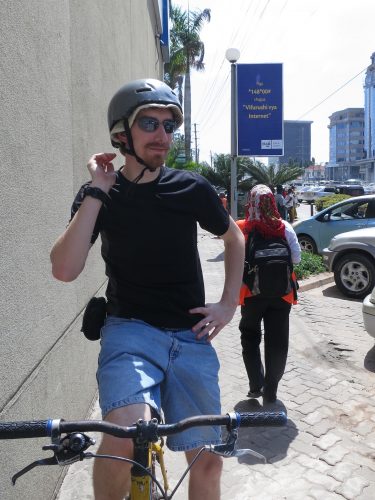
The omnipresent “travelin’ hat” does double duty protecting one’s hair from a shared bike tour helmet
But at long last, we were on our way, we crossed the main road to head into the smaller, lower class neighborhoods (Fedinand’s words, not mine) and then, 3 minutes into the ride…Christine’s entire left pedal fell off. I stared at in, then at Fedinand, and asked him directly “exactly what kind operation is Tende running here?”
Fedinand hopped on his bike, grabbed Christine’s like he was leading a spare horse, and promised us he’d be back in 8 minutes – and he actually was! With a replacement! He rescued us with his return from a large bearded man who’d come across us and was teaching me, with piercing eye contact and large back slaps, different swahili words for eyes, ears, legs, shoulders, etc. He’d point to one thing – his nose, for example, and shout “POOHAH” and I’d repeat it back to him. Finally at the end he pointed to his crotch and then… Shrugged, slapped me on the back, laughed, and walked away. I’ll admit now that the only word I remember is nose. I’m a little exhausted at the moment.
Fedinand was, once we finally got underway with the replacement bicycle, an excellent guide. He greeted and returned greetings to hundreds of people, who seemed more interested in him as a leader of two tourists, then us ourselves. He has a charismatic smile and personality, and usually it was only the younger children – under 10 years old or so – that reacted so happily to the two Wazungu. He explained to us that the reason that there were so many Arabic words in Swahili is because the Arabs colonized the Eastern coast of the African continent several hundred years ago – the first explorers that the tribes that would become Tanzania in the 20th century met. I asked him if Arabs, then, were also called Wazungu. He admitted that while the word meant Explorer, it still meant only white explorers. It was the Germans that colonized the region in the 1800’s, before being replaced by the British after losing the world wars, and both nations built lots of railroads, established trade routes, and most importantly, established the idea of a national school system. Fedinand seemed to really respect the colonizers for that. Happy they were gone and the Tanzanians could govern themselves, but also happy that the West brought progress to his people.
I wish I had more photos to share now – and I do! But unfortunately they’re all on my actual camera, which uses a regular sized SD card instead of the microSD that this phone I’m typing on takes. I will to write as much as I can remember now, and add photos to these entries when I return to America. To be honest, today was so information dense that it will probably be by far the most I have to write about – the national parks and safari will be beautiful and interesting and I plan to take lots of pictures but I don’t think I’ll have nearly as much raw information crammed into my head.
We stopped by a walking coffee vendor, Fineas, who was a friend – Rafiki – of Fedinand’s. “He’s a Muslim – see how he wears that flat topped hat? That’s how you know.” We were treated to strong Turkish coffee, hand-ground with a mortar and pestle by Fineas, as well as a kind of peanut brittle, minus the brittle, that serves as the sugar for the coffee. They never put sugar or milk into the coffee, but the soft, chewy peanut and caramelized sugar snacks paired well with it. “Yislaamu e-dayk” I told Fineas as he handed me the coffee – the traditional Islamic phrase meaning “Bless your hand” that you say to someone as they hand you a beverage. Fineas looked at me in confusion and I told Fedinand what it meant. Fineas laughed and jokingly shoved Fedinand a bit. “Oh man I’m embarrassed guys… He’s not a Muslim, he just likes wearing their hat.” We all laughed, and Fedinand explained that the two religions got along well in Tanzania and no one minded borrowing culture, clothes, and phrases from the other.
He explained as well that besides the Abrahamic religions, voodoo and black magic worship was also strong in these lower class areas, and that he himself was starting to believe in it too, just because he’d seen it work so often for friends of his. For things like job interviews, you’d take this kind of powder, mix it with water, and then sprinkle it on yourself – but be careful not to speak to anyone else besides the interviewer or the spell would be broken! Love struck men would offer charms to their women, and women would put blessed water on their faces 3 times – precisely- to become more beautiful. He even showed us a tray of rotten eggs which you could use to curse someone.
One of the things I think Christine enjoyed the most was having Fedinand show us the Kangas and Kitengas, two similar kinds of women’s clothing that are extremely popular in the area. The former are originally a Nigerian invention, simple rolls of beautifully and intricately patterned cotton with pictures of people or more usually, phrases written along the edges. Women use them to communicate catty or friendly sayings to friends – and enemies. He brought down a few and read them off to us in Swahili – “this one means roughly don’t speak ill of me because of how I am, God made me this way. Do not hate me because I am beautiful!” and “May god give me strength to ignore the mean things you say” He also said politicians would pay factories to make custom Kangas with their pictures or slogans on them, and more shady ones would pay off women to wear them. Every politician he could think of at the very least had Kangas made. He said there was an Obama one made back in 2008. I pleaded with him to tell me we could buy one right now but he told us that unfortunately they’d be sold out and no longer made for years.
Speaking of politics, we were asked frequently where we were from, and just for ease of describing, we usually said “Chicago” – to which we were frequently told “Obama! Obama!” and sometimes “Trump good?” A hard lump of sadness and nostalgia rose in my throat when I remembered very similar broken conversations just after I arrived in Jordan, with no grasp of their language either, and was having similar but much more optimistic conversations with the Arabs about the new young president, Barack Obama, who had just won the presidency. Now, via Fedinand’s translation, all we said was we had supported Obama, and voted for Clinton, and we were not happy with a Trump presidency. The question askers merely nodded, a bit sadly, and we didn’t speak further on that subject.
We saw other things, like a flock of semi wild goats running around horribly polluted local stream, that the locals believed were protected by spirits and therefore no one touched or interfered with their roaming and grazing. We saw a small room with loud blaring little TV with an overdubbed audio track – this was the usual way for poor Tanzanians to get their movies, we were told, someone would rapidly read their interpretation of the plot in Swahili over the original dialogue and some of the music. Because it was the day after the new year, the room we were in was filled with a couple dozen young children who immediately abandoned all interest in the movie, turned around, and stared at us with gape-mouthed faces.
We saw a bareshouldered Muslim midwife named Bibi (grandma) Zeitooni, or Grandma Olive in Arabic, who helped raise money for her community by selling doormats and pillows made from the refuse cloth from Kanga/Kitenga making. I bought one of the pillows from her for $5. We saw a funeral procession with two hundred mourners, dressed in beautiful colorful clothing and chanting, waiting, stomping their feet as they walked through the street towards a nearby cemetery. A man in the front led the processional with a wooden cross, with the deceased’s name and birth/death date on it. We saw a huge food and used clothing street market with spices, an entire square city block filled with mango sellers, and coconuts being allowed to “rot” so they could be easily crushed for their oil, which was being bottled. We also saw – or heard – a mother being loudly shamed by several dozen shopkeepers for apparently smacking her child quite hard when he misbehaved. I didn’t see that happen but I heard the smack and we looked over across the stalls and saw shopkeepers raising their voices, pointing at her, and chanting a phrase over and over again. This went on for about 20-30 seconds and the mother, who looked about my age, held her head up stoically and kept walking in silence, not making eye contact with anyone. “Yes,” said Fedinand “Tanzanian people will always call someone out if they see them doing something they don’t agree with. We do not let bad parenting happen in silence.”
We bid Fedinand a fond farewell back at the millennium tower after he bought us lunch, a delicious salty snack of fried British style “chips” mixed with fried eggs and hot sauce – “chips na mah-eye” which just means “chips with eggs” – we told him we’d send him the photos that we’d taken with the happy children who wanted to pose with us, and he told us he’d print them off and give them to their neighborhood leader to put up around the area.
We walked another half hour in the hot 4pm sun along a main road, towards the Airtel phone company’s main office. I wanted to be able to get a SIM card to continue to write and upload from the National parks up north, and Airtel supposedly had the best coverage up there. The building was huge and impressive – easily 6 stories tall, metal and glass, with a half dozen entrances. We were a bit amused and surprised when, upon asking for a SIM card, we were directed back out of the building and to what appeared to be a converted cargo trailer out back, where three very bored looking women were the official Airtel salespeople for SIM cards.
We were hot, sweaty, bedraggled and probably still smelled a bit like the river we’d passed by two hours before. I was carrying a somewhat rumpled pillow made out of scraps of colorful cloth. The woman who took my passport info and handed me the SIM card kept eyeing it skeptically across her desk and finally, just as the process was finishing up, burst out “Wazungu, what is that thing?” I tried to explain that it was from a medicine woman, a pillow, and her sales associates burst out laughing. I wasn’t sure how much they were understanding of my English – they seemed to speak it well enough – but then she said, shaking her head “I see someone carrying this thing like this, I think he is crazy. Are you a crazy Wazungu?” To which, I could do nothing but helplessly shrug and say “It is a souvenir to remind me of Tanzania when I am back home!” She rolled her eyes and said “you are crazy, Wazungu – what would you want that thing for!!” But then she helpfully told us how much the local buses cost and gave us some change for my large 1000 shilling bills, so she wasn’t completely rude. Even so, as we walked back to the fancy main building to put 3GB worth of 3G service credit on my new SIM card (which cost a mere $7! Mindblowingly good price in my opinion) Christine said that the woman had made her feel uncomfortable with how direct her opinion of my mental state was. I guess I didn’t look at it that way, personally – I’ve always just kind of done whatever I feel like and basically ignored what anyone thinks of me. And if I brightened up those bored Tanzanian SIM card selling ladies day with my weirdness, then more power to ’em.
We took the bus back to near Millennium Tower, and walked back to Collobus from there, my S7’s battery rapidly nearing zero after a day of using Runkeeper to track our cycling location and length (6.16 miles, by the way). The SIM card worked – I had functional 3G data service and we’re free to hunt for a restaurant to go to later tonight. This crazy Wazungu and his girlfriend have got some Dar es Salaam nightlife to see!
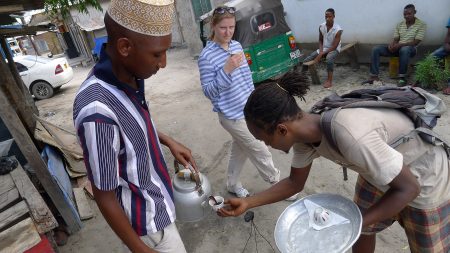

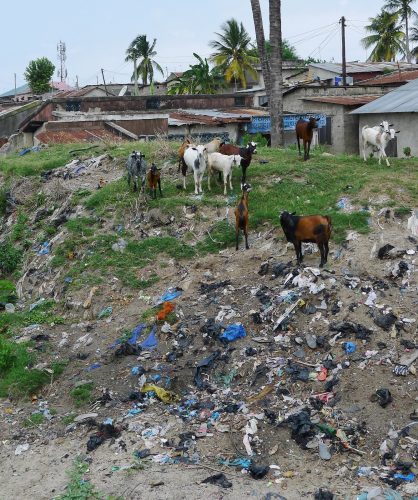
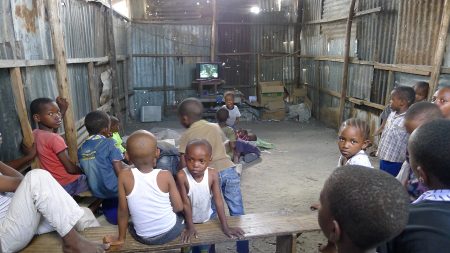
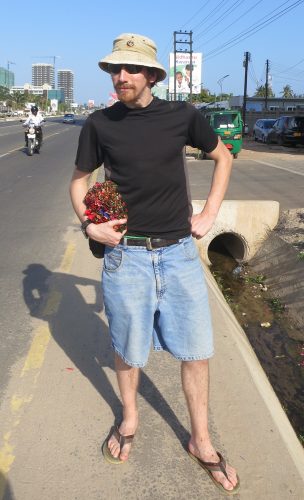


Huh, and here I was thinking that wazungu was a kind of beef. Shows what I know!